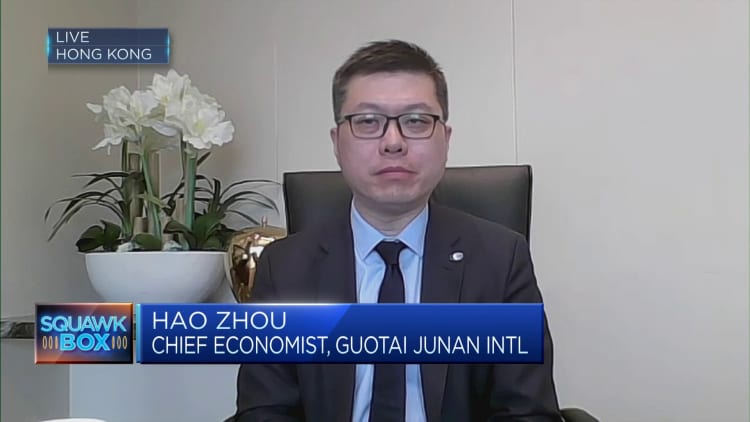[ad_1]
When Eunice Wang received a job as a technique guide at a pharmaceutical firm in Beijing, it was a dream come true.
The dream was six years within the making: She graduated from school majoring in organic engineering, and later accomplished a grasp’s in enterprise analytics in america.
However it took simply three months for the 25-year-old to name it quits.
“I assumed I might keep for one full yr, however I assumed, wow, I might slightly kill myself. I would be actually hopeless,” she stated.
Wang moved again to her hometown in northern China to be a barista six months in the past. Such a swap from a white-collar job to “qing ti li huo” (or “gentle labor” in Chinese language) is gaining recognition amongst youthful individuals within the nation.
Loads of younger individuals may really feel disenchanted about their jobs as a result of corporations aren’t hiring them for a job, however they’re hiring you to function a pc on a desk.
Jia Miao
Assistant professor, NYU Shanghai
A hashtag that interprets to “my first bodily work expertise” has 30.3 million views on social media platform Xiaohongshu, the place some customers describe their new jobs as a “no-brainer.”
Such jobs embody being a supervisor at a quick meals restaurant, wait workers and cleansing crew — something however sitting in an workplace.
“There’s a number of dialogue on-line the place younger persons are sharing about how they escaped from their white-collar jobs as a result of they are not glad,” stated Jia Miao, an assistant professor of sociology at New York College Shanghai.
Wu Xiaogang, a sociology professor from the identical college, added: “It’s fairly uncommon. If in case you have a university diploma, you are alleged to be a white collar employee.”
A paper co-authored by Wu estimated that a minimum of 1 / 4 of school graduates in China are underemployed — and that is on high of a document excessive youth unemployment price. Underemployment is when persons are in jobs that don’t mirror their abilities or coaching.

“What’s simple is that after Covid-19, whereas China’s financial system is recovering … a number of younger individuals actually struggled to discover a job. A few of them selected to search for a lightweight labor job to attempt to help themselves,” stated Miao.
That is not fairly the case for younger staff like Wang, nonetheless, who’re participating in what consultants CNBC spoke to name “a voluntary withdrawal” from expert work.
‘Dehumanization’ of staff
Wang imagined that her workplace job as a guide could be “actually artistic,” anticipating collaboration with colleagues and leaders. However she stated the fact was a far cry from that.
“I did not have the time to speak with anyone due to the workload,” she stated.
As an alternative, her days have been spent drawing up slides, writing reviews in Mandarin and translating them to English — what Wu describes as clerical work that requires “little mental problem.”
You shouldn’t have a way of self, although you’ve got some type of occupational status.
Wu Xiaogang
Sociology professor, NYU
Extra school graduates have gotten “xiao bai ling” — or “small white-collar” in Chinese language, Wu stated.
Miao added that “small” refers not solely to the age of staff but additionally their roles — that are sometimes junior ones that require little decision-making or private enter. This “dehumanization” of staff, nonetheless, is just not new, she added.
“When our society moved from agriculture to industrialization, from farm to factories, the work didn’t want creativity or autonomy. You might be wanted in a selected place to do the identical factor repeatedly,” she stated.
It simply felt like if I did not get a ‘actual job,’ all the things I did earlier than could be meaningless. There was a very robust worry that I might be a failure.
“The identical factor is going on now as our financial system turns into extra mature and complex … Loads of younger individuals may really feel disenchanted about their jobs as a result of corporations aren’t hiring them for a job, however they’re hiring you to function a pc on a desk.”
Given excessive competitors and a grueling “996” tradition, work has turn out to be emotionally and bodily draining for younger professionals, Miao stated.
“You shouldn’t have a way of self, although you’ve got some type of occupational status,” Wu added.
‘Dramatic change’ in work values
Even so, younger individuals like Wang proceed to grapple with the normal expectation of going to school and getting a “good” respectable workplace job.
“I used to be advised that if you happen to sacrifice your private time, if you happen to put in a number of effort and keep up late — in the long run you’ll turn out to be an elite, you may be admirable,” she stated.
“It simply felt like if I did not get a ‘actual job,’ all the things I did earlier than could be meaningless. There was a very robust worry that I might be a failure.”
Younger professionals around the globe have been questioning the that means of labor in recent times, with actions like “quiet quitting” and “naked minimal Mondays” gaining recognition.

And in China, there’s the phenomenon of “tang ping,” by which youths reject a tradition of overwork and embrace “mendacity flat.”
The nation’s speedy financial transition is what’s inflicting a “dramatic change” in work values, stated Miao.
“For the older era, they labored beneath a deliberate financial system … the place work is mixed with a patriotic spirit, such that your work is contributing to a brand new, socialist nation,” she stated.
“However now, since we now have amassed a sure degree of GDP and financial foundations … younger individuals wish to really feel individualism. They do not consider that their final objective is to contribute to the nation.”

It was solely in hindsight that Wang realized she by no means “personally wished” to pursue her main, or be in a white-collar job.
“I seemed again and I noticed it was as a result of my dad and mom advised me to decide on it, individuals advised me that with this main I would have a very, actually nice future,” Wang stated.
“However I by no means thought of whether or not the job would even be appropriate for me — it appears good on a resume, however will I get pleasure from this?”
A brand new definition of success?
The lure of “gentle labor jobs” for white-collared staff comes within the type of “extra freedom and suppleness” in work schedules, stated Wu — and the trade-off is much less job safety and revenue.
“I will not encourage everybody to only stop their jobs to do that … I do typically mirror by myself privilege, how I can solely pursue this as a result of my dad and mom are middle-class and I haven’t got to fret financially,” she added.
Wang earned about 12,000 Chinese language yuan ($1,700) a month in her white-collar job. As a barista, she earns 1 / 4 of that and receives “slightly” monetary help from her dad and mom.
However what could also be priceless to her is the self-discovery Wang stated she’s been in a position to expertise after strolling away from her white-collar job.
Individuals might say, you took a very long time to complete your grasp’s and you find yourself serving espresso? A job that individuals who simply completed center faculty or main faculty can do?
“Individuals might say, you took a very long time to complete your grasp’s and you find yourself serving espresso? A job that individuals who simply completed center faculty or main faculty can do?” she stated.
“The normal Chinese language pondering is: In the event you do not go to school, if you happen to do not put in effort in your job purposes, you may find yourself being a waitress, cleansing workers on the road.”
However Wang stated she’s come to appreciate that these jobs aren’t so simple as many consider them to be. For instance, being a barista not solely allowed her to choose up abilities about coffee-making, it additionally helped her overcome her worry of placing up conversations with individuals.
“Previously, I might have been actually self-centered and never given [blue-collar workers] a second thought,” she added.

“However truly these jobs could be respectable too — why are some jobs thought of lesser than others?”
Wang stated she now finds satisfaction in her job that she wasn’t capable of finding in her earlier one, whether or not it is by latte artwork or seeing completely happy prospects.
“It is a humorous factor to say, however going to work makes me completely happy now,” she stated with fun.
“I used to be actually unhappy about [leaving my office job] as a result of all these years I actually tried to suit the mould. However I feel I can by no means be the person who society desires.”
— CNBC’s Ulrica Lin contributed to this report.
[ad_2]
Source link







